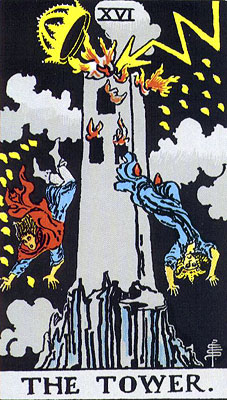The Tower
 Reading the local paper, I find that lots of residents are upset about the prospect of mobile phone towers being erected in our back yard. I am sympathetic, but bemused at the mass paranoia on display. After all, I have heard of the inverse-square law, but maybe they haven’t.
Reading the local paper, I find that lots of residents are upset about the prospect of mobile phone towers being erected in our back yard. I am sympathetic, but bemused at the mass paranoia on display. After all, I have heard of the inverse-square law, but maybe they haven’t.
Here’s the letter I wrote in reply:
Dear Editors,
Concerning the letters protesting the proposed mobile phone towers for Norton Plaza.
Firstly Cr Porteous may be waiting a long time for “conclusive information stating that there is no danger associated with such an installation”. Such blanket statements of public safety simply are not products of scientific endeavour. As Phillip Dendy commented in the British medial journal The Lancet: “A Nobel prize awaits the person who first designs an experiment to show that anything is ‘safe’”. He was talking about mobile phone safety, too.
Frustrating as it may be to us ordinary humans, the best you get out of scientists are estimates of risk based on experimental evidence and analysis. Such equivocation is a scientific necessity, so let’s all just get used to it shall we? (At least until the Nobel prize for provable safety is handed out.)
And frankly such definitive (if not conclusive) statements of risk would add a great deal to the standard of debate for this issue. If we were to compare the relative risk and severity of a new mobile phone tower against, say, an increase in local traffic volumes, I know which one I’d be protesting against. Hint: it’s not the mobile phone tower.
Despite the inconclusive information about adverse health effects of mobile phone towers, one thing is pretty clear. However risky the towers are, handsets are a lot worse.The proximity of the handset makes it a relatively intense source of non-ionising radiation.
So to those parents who are protesting the mobile phone tower, can I suggest that if you are also allowing your children to use mobile phones, you haven’t understood the risks very well at all.
Regards,
One of the letter-writers mentioned a UK based physics professor by the name of G J Hyland. Hyland’s paper, published in the same issue of The Lancet as the Dendy comment linked above, is worth reading. My initial assumption on hearing about the controversy was that the inverse square law will save us, but the paper makes it clear this assumption may be wrong. Hyland makes the case for “non-thermal” effects of mobile phone radiation which are due to an “oscillatory similitude between this pulsed microwave radiation and certain electrochemical activities of the living human being”. The photosensitive epilepsy induced in some people by strobed light is used as analogy: it’s not the intensity of the light, but the similarity of the strobe frequency with certain brain activity.
[Incidentally, researching this has prompted me to make my first contribution to wikipedia. The entry on mobile phone radiation and health did not mention Hyland’s work so I added it. This was a mildly daunting experience. A few days later and my contribution hasn’t been removed … yet.]
Lastly, it’s too difficult to resist pointing out that the tarot deck seems to be right on the money this time. The Tower card (pictured) “represents nice fantasies being shattered by harsh reality”. Heh, maybe there’s something in this tarot stuff after all!
3 Comments